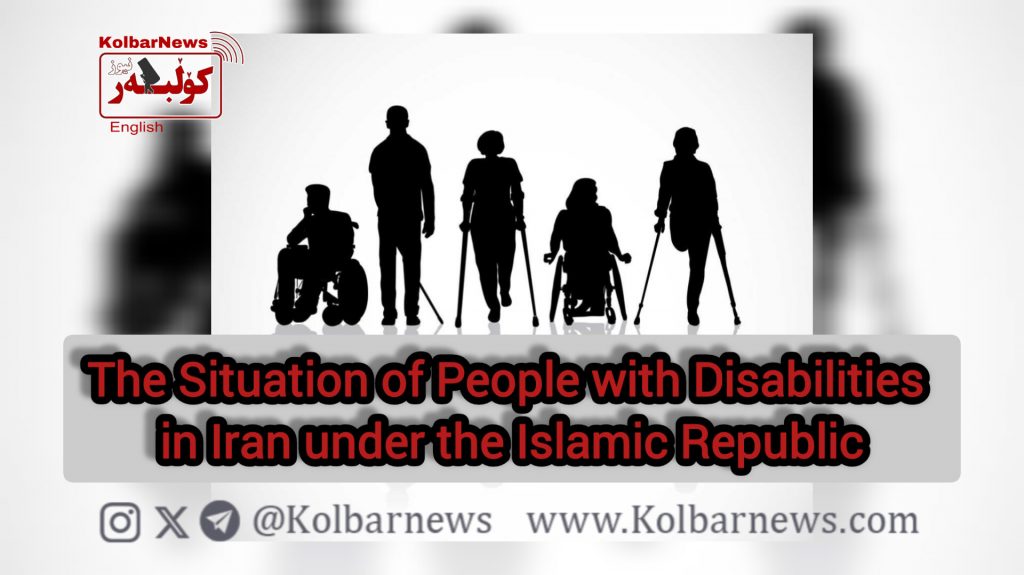
The official news agency ILNA has published a shocking report on the conditions faced by people with disabilities in Iran. This report reveals the peak of discrimination, injustice, and cruelty toward disabled individuals and retirees. In an interview, Kolivand, a representative of retired individuals with disabilities and an activist for their rights, told ILNA’s reporter:
“We have about two million people registered as disabled with the Welfare Organization in the country. A significant portion of them are retirees or elderly. For instance, the ‘nursing stipend’ provided to war veterans, which is rightfully theirs, is 22 million tomans per month. However, for those registered as severely disabled with the Welfare Organization—who are not war veterans—the stipend is only 2.2 million tomans. This amount is practically one-tenth and nearly ineffective. We argue that while many of these disabled people are not war veterans, they still have rights in society.”
He further highlighted the healthcare challenges retirees in this sector face, saying, “Disability-related costs are two to three times higher than those of ordinary people. We bear very high medical expenses.” Kolivand added, “Some of our disabled friends have recently won rulings from the Administrative Justice Court. Interestingly, the Welfare Organization is appealing these rulings to avoid paying even this minimal and shameful pension! This is beyond strange, as not a single rial has been received by any disabled person for securing that ruling.”
Beyond the issues Kolivand mentions, numerous other problems make life extremely difficult for disabled individuals in Iran: challenges with urban and intercity transportation due to a lack of accessible infrastructure; employment issues due to insufficient protective laws; societal attitudes rooted in cultural biases; neglect of talents that could enable people with disabilities to rebuild their lives; financial struggles from inadequate employment opportunities and high living expenses; and educational, marital, and economic barriers due to the lack of resources and facilities in schools, universities, and workplaces.
The way a society treats its disabled citizens serves as an indicator of its governing system. In Nazi Germany and other fascist regimes, this segment of the population, which had special needs, was met with denial, suppression, and even death. In some religious interpretations, physical and mental limitations are described as divine will, attributing disabilities to “rewards” for uncommitted sins, reflecting a lack of logical and scientific reasoning regarding people with disabilities.
Under the Islamic regime in Iran, true statistics on the number of disabled individuals are never released. Official figures only account for those under Social Security’s care, roughly one-tenth of the actual number. Estimates from non-governmental organizations and the World Health Organization indicate that around 12% of Iran’s population has a disability, with over 60,000 people added each year.
Three pillars—government, society, and family—are essential for addressing the needs of people with disabilities. The government bears the primary responsibility for providing specialized care, employment, education, healthcare, comprehensive insurance, transportation, and housing for people with disabilities. A society that respects human rights and guarantees the basic rights of all its citizens will treat people with disabilities as equal citizens and actively oppose discrimination and humiliation. The family also plays a critical role in either affirming the needs of people with disabilities or denying their necessity.
Kurdistan is one of the regions in Iran where disabled individuals are deprived of even the minimum support available in other parts of the country. Poverty, unemployment, a lack of state-provided services, 45 years of military occupation, and the risks posed by land mines and shootings at local porters have left many with physical and mental disabilities. The Islamic regime refuses to accept responsibility for people with disabilities, neither in Kurdistan nor across Iran. Even a fraction of the significant funds spent on militarism, public suppression, terrorism, and reactionary interventions abroad could secure a humane life for people with disabilities. Meeting these needs should be a priority for any future government that replaces the Islamic Republic through revolutionary change.

